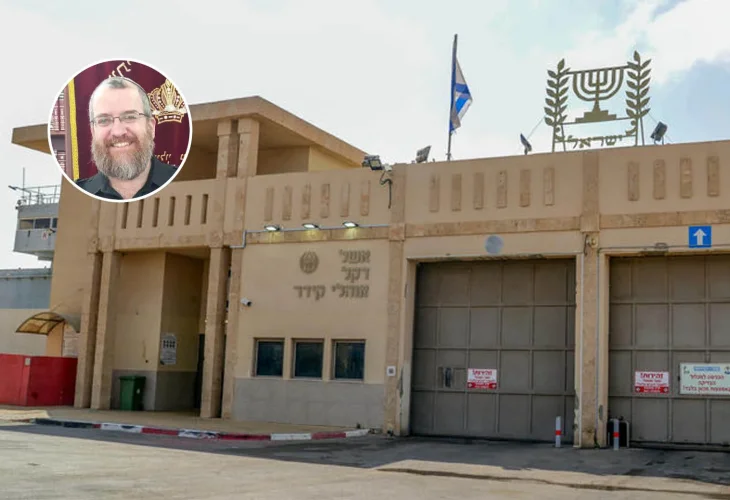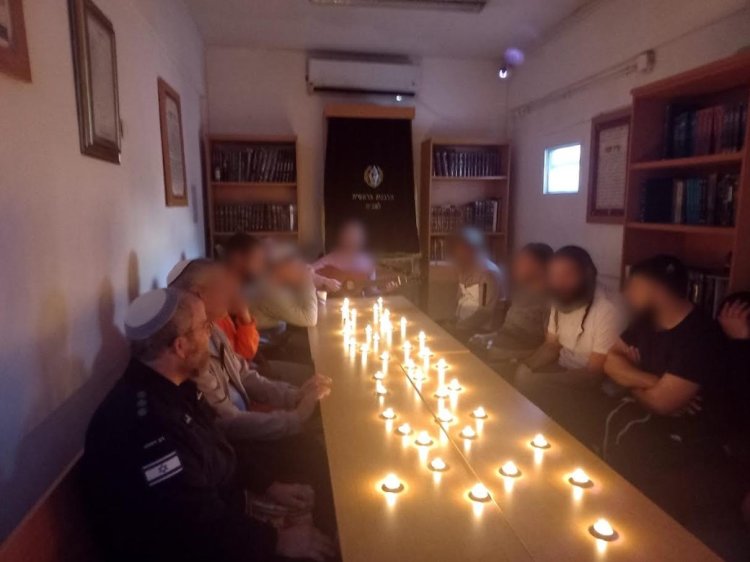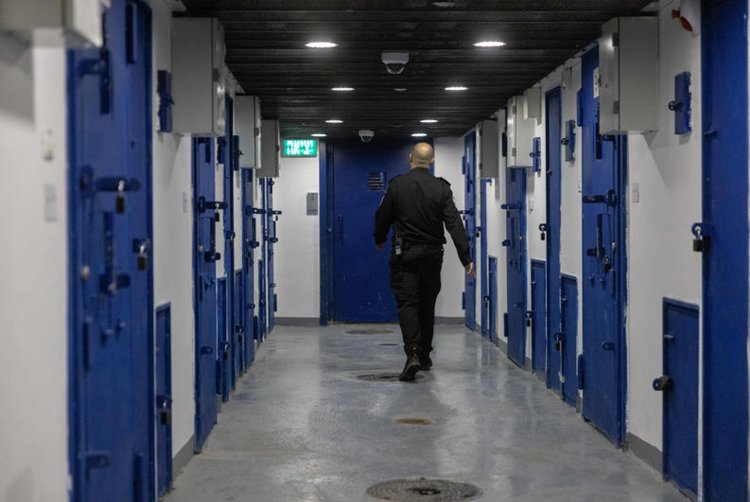Spiritual Transformation Inside Israel's Most Secure Prison
Rabbi Eyal Ben David is driving a spiritual revolution at Eshel Prison, providing spiritual support to complex inmates and guiding them towards personal change.
 Eshel Prison (Photo: Flash90). Inset: Rabbi Eyal Ben David (Credit: Israel Prison Service)
Eshel Prison (Photo: Flash90). Inset: Rabbi Eyal Ben David (Credit: Israel Prison Service)At first sight, it seemed like a surreal scene: in one of the most complex wings holding life-sentence inmates, prisoners sat around a long table with their eyes closed in devotion. The dimly lit room was centered around flickering candles, as an emotional bonfire gathering took place within the walls.
Accompanied by deep guitar sounds, soul-stirring songs resonated during the bonfire, concluding with a rendition of "Our Brothers, the Whole House of Israel," dedicated to the return of captives. Rabbi Eyal Ben David, in a special interview with Hidabroot, describes, "Within the walls and bars, the prisoners' song 'Our Brothers, the Whole House of Israel' becomes a heartfelt cry. It expresses their genuine desire to change and break free from their personal constraints."
For the past two years, Rabbi Ben David has been spearheading a spiritual revolution in Israel's most complex detention facility. He designs faith-based rehabilitation programs for inmates, organizes diverse educational workshops, and provides tailored spiritual care for each prisoner. "A prison rabbi's role is sensitive and challenging," the rabbi explains. "To touch hearts, actions must stem from parental and emotional places. Only then can paths to their scarred souls be paved."
 (Credit: Israel Prison Service)
(Credit: Israel Prison Service)The Inmates' Father
Rabbi Ben David boasts a long resume with the Israel Prison Services. Up until two years ago, he also served as the rabbi of two security prisons in central Israel, providing religious services to prison guards and criminal inmates. He was then selected as the rabbi of Eshel Prison. "Eshel Prison has complexities not found in other prisons," he explains. "Mostly life-sentence inmates reside here, facing the despair accompanying their long-term sentences. To influence these inmates, one must chart a long path to their inner world, reaching into their depths. Only then can hearts be touched, leading to mutual openness."
A prison rabbi's responsibilities are numerous. Rabbi Ben David notes that initially "there's a need for constant supervision over the kashrut framework, maintaining close watch on food production and adherence to guidelines. In kashrut, there's a specific aspect ensuring religious inmates receive mahadrin food per their lifestyle choices."
"Another equally complex area is operating Torah study centers in the wings. In the high-security wings, inmates stay in separate cells all day, and these centers offer them an uplifting educational period once a day. This is when they can escape their reality and fill their souls with spiritual light, dispelling darkness and gloom."
Rabbi Ben David also coordinates volunteers within the prison: "Volunteer activities bring a refreshing change within the walls. We bring rabbis and educators for classes and lectures, as well as musical volunteers who bring joy to the inmates' hearts."
Dancing with Tears
The flagship initiative led by Rabbi Ben David is the "Personal Empowerment" project, creating faith-based rehabilitation programs for inmates. "We select suitable inmates for the project and develop a personal study plan based on their abilities and skills. We tailor a tractate of Talmud for the inmate, offering a dedicated weekly lesson for a long duration."
"Step by step, inmates progress page by page. At the end of each topic, they undergo a comprehensive test on what they've learned. Recently, we celebrated finishing a tractate with a life-sentence inmate, conducting a final exam covering 50 pages and around 400 questions. He spent a month answering diligently, achieving 100%."
Were you surprised by this?
"Honestly, no," says the rabbi. "These inmates are motivated to learn and grow, and the exams ignite a strong desire to succeed and progress, helping them overcome obstacles with hard work and persistence."
How does an inmate feel after completing and successfully passing a tractate exam?
"It's indescribable. Consider that some of these inmates have never succeeded in any educational framework or taken an exam before. After a year of consistent participation in complex Talmud lessons, having passed each exam, they look back in disbelief. During a celebration of completing a tractate with an inmate, he tearfully stumbled through the words of 'Hadran Alach.' As we broke into joyful dancing, we danced with the tears."
Rabbi Ben David notes the prison service supports all therapeutic activities advancing inmates, aiming at rehabilitation and new beginnings: "Both for study projects and volunteer musical events within prison walls, full backing comes from the unit command, viewing them as opportunities for profound rehabilitation processes. Additionally, these activities are part of a broad view requiring governance within prison walls, aligning with Commissioner Kobi Jacobi's policy."
 (Photo: Chaim Goldberg / Flash90)
(Photo: Chaim Goldberg / Flash90)Am Yisrael Chai
For long hours, I observed Rabbi Ben David closely, watching his work. These were fascinating times, exposing me to the spiritual revolution within the prison walls, where complex inmates with turbulent criminal records are held. The rabbi successfully reaches each of them, offering spiritual tools to reconsider their life paths.
To finish, Rabbi, do you have any interesting stories from your role?
"Yes," the rabbi smiles. "One morning, I arrived at a wing where daily study sessions occur. An inmate approached, sharing that he's housed with a non-Jewish inmate who daily yells in his ear 'Death to Jews' at 5:00 a.m. I promised to handle it, reporting to the intelligence officer. A few days later, I visited the wing again, inquiring about the inmate's wellbeing. He told me that morning the non-Jewish inmate again yelled at him at 5:00 a.m., but this time, he shouted 'Am Yisrael Chai'..."

